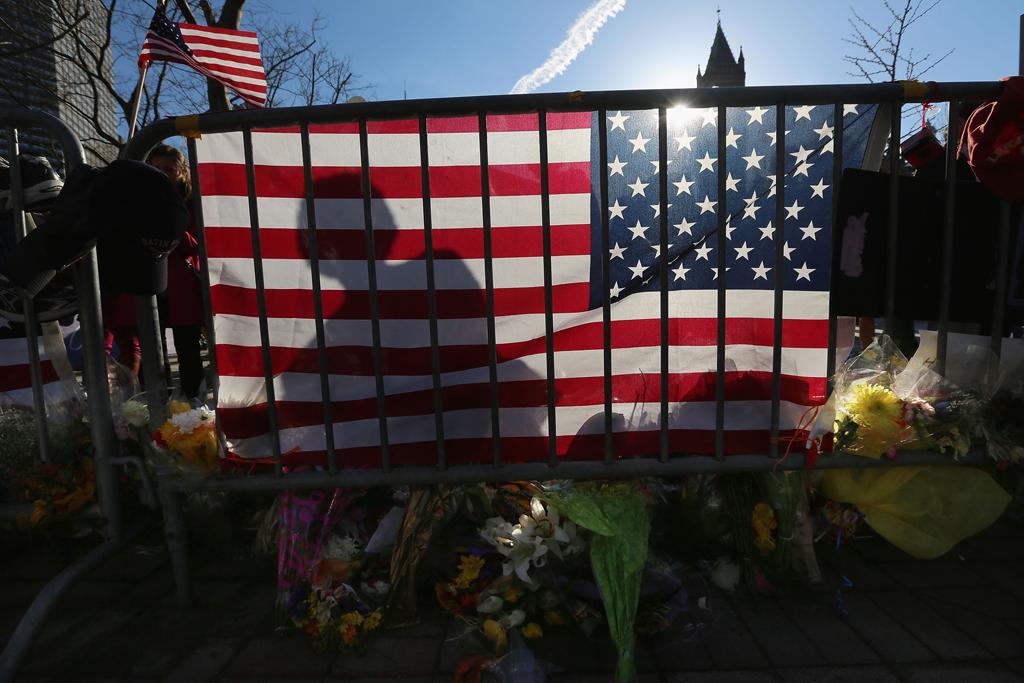Boston Marathon bombings: a Pakistani perspective
A makeshift memorial in Copley Square, near the site of one of the Boston Marathon bombings, on April 24, 2013.
CAMBRIDGE, Mass. — Historic Copley Square is one of my favorite places in my adopted city of Boston. This is where, last month, we held a vigil against Shia killings in Pakistan. This is where runners at the Annual Patriots’ Day Marathon cross the finish line at Boylston Street, right past the majestic public library.
And this is where, on April 15, two bombs exploded, disrupting the idyllic scene of the marathon on a crisp, sunny Monday afternoon.
I was in New York when I heard. As millions around the world felt Boston’s pain and prayed for the dead and injured, another collective prayer arose from many hearts: “Please don’t let the bombers be Muslim. Don’t let this have a Pakistani connection.”
The bombers turned out to be two young men, brothers of Chechen origin — Muslims — but so far, no link to Pakistan. We don’t yet know why they did it, but one can see parallels with the “Times Square bomber” Faisal Shahzad. After falling on hard times like Shahzad, Tamerlane Tsarnaev, 26, the elder brother in the Boston bombing, turned to radical religion and conspiracy theories about the West versus Islam.
This is essentially the ideology behind the militants causing mayhem on a much larger scale, making such scenes tragically familiar in Pakistan. From January 1 to April 14 this year, 184 bomb blasts killed 626 and injured 1,159 in my country.
Targets include residential blocks, mosques, shrines, markets, schools, government offices and military bases. The dead include children and young people with their lives ahead of them, like the brave, smiling activist Irfan Ali.
Bombings are rare in the United States, but violent attacks are all too common. Horrific mass shootings just last year include the massacres at a Colorado cinema, a Sikh gurudwara in Wisconsin, and an elementary school in Sandy Hook, Conn. In 2011, firearms killed 8,583 people, according to FBI records. Firearms are multiplying faster than the population rate; over 310 million guns will soon surpass America’s 312 million population.
Last May, a drive-by shooting killed 16-year-old Charlene Holmes, my daughter’s classmate at Cambridge Rindge and Latin School, while she was walking home with her sister a few blocks from our rental home.
The previous year, just after we came to Cambridge, a bomb targeting a police officer’s residence went off near my daughter’s school in Karachi. A teacher and her young son at the next school were killed. Dozens were injured. My daughter’s friends witnessed the blast, the shattered windows, the blood.
“It’s the same everywhere,” she commented after Charlene died. “People talk about how much better it is in America, but people get killed here too.”
A major difference, however, is how the authorities respond in Pakistan and America. Although Charlene’s killers have not been caught, the police here are trained, equipped, and enabled to take their job seriously. Rogue officers who kill suspects and fabricate evidence are the exception, not the norm. In general, the criminal justice system works.
The authorities’ responded with great competence to the Boston marathon bombings, using technology to track down the suspects whose photos they released to the public. They enforced a citywide lockdown, encompassing neighboring towns, after the suspects went on the run, killing a police officer at MIT a mile from where we live. Public announcements warned people to stay indoors; schools and colleges, shops and public transport, were shut down.
“What would happen if we locked down a city after each attack? We'd be in perpetual paralysis,” commented Pakistani journalist and television anchor Quatrina Hosain.
True. But if Pakistani authorities took crime as seriously and responded as aggressively the first time around, perhaps we wouldn’t be in the situation we now face.
Pakistan must urgently end the impunity with which criminals operate; train, empower and enable police to do their job effectively; ensure that the criminal justice system works efficiently; introduce a witness protection plan at least.
#Bostonstrong was a trending hashtag on Twitter after the Marathon bombings. I visualize #Pakistanstrong, facing terrorists who are now targeting political rallies in the run up to elections: Peshawar, April 17, 15 killed; Quetta, April 22, six killed.
Unlike Pakistan, America values the lives of at least its own citizens. Which is the least any government should do.
Beena Sarwar is a Pakistani journalist, who is a fellow at the Ash Center for Democratic Governance at Harvard Kennedy School. She was a Nieman Fellow in Journalism at Harvard in 2006. Her blog is: www.beenasarwar.wordpress.com; she tweets @beenasarwar
We want to hear your feedback so we can keep improving our website, theworld.org. Please fill out this quick survey and let us know your thoughts (your answers will be anonymous). Thanks for your time!
